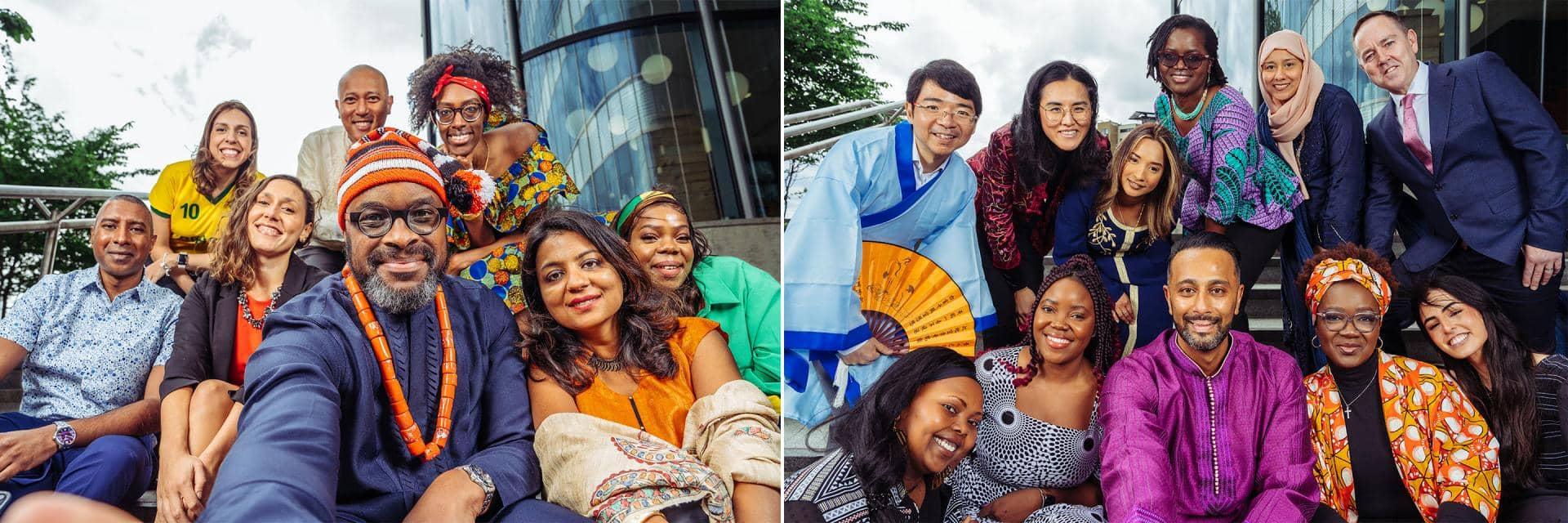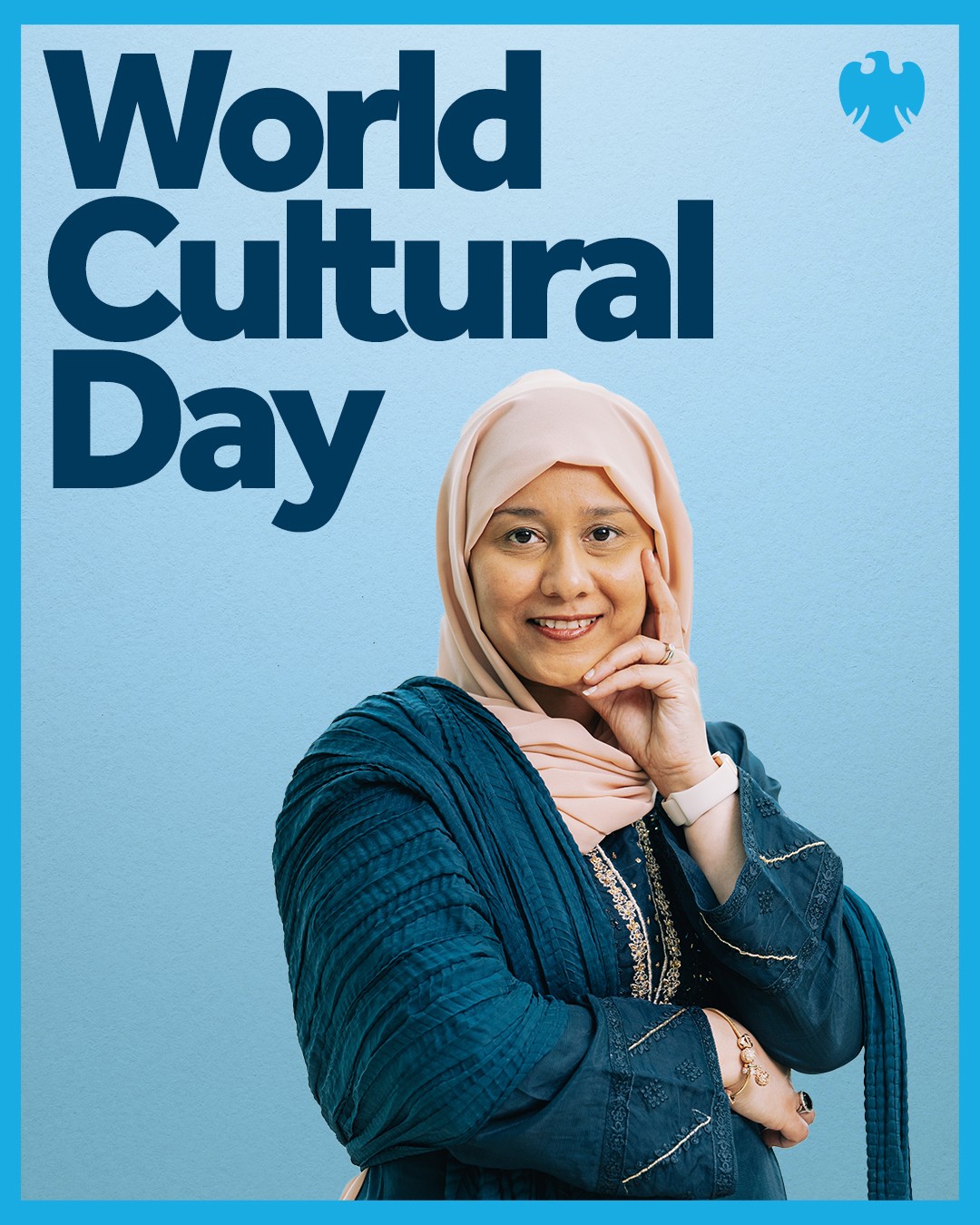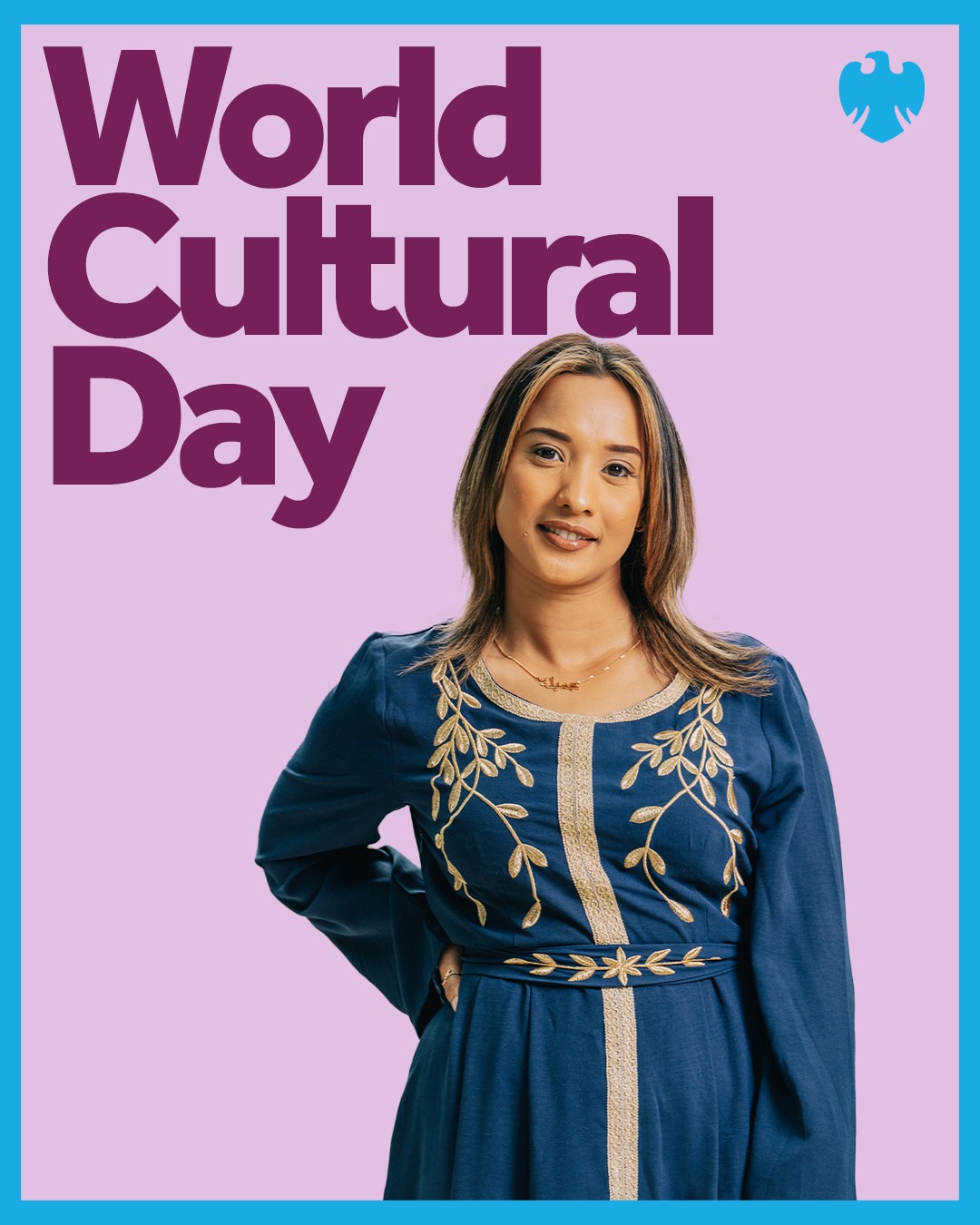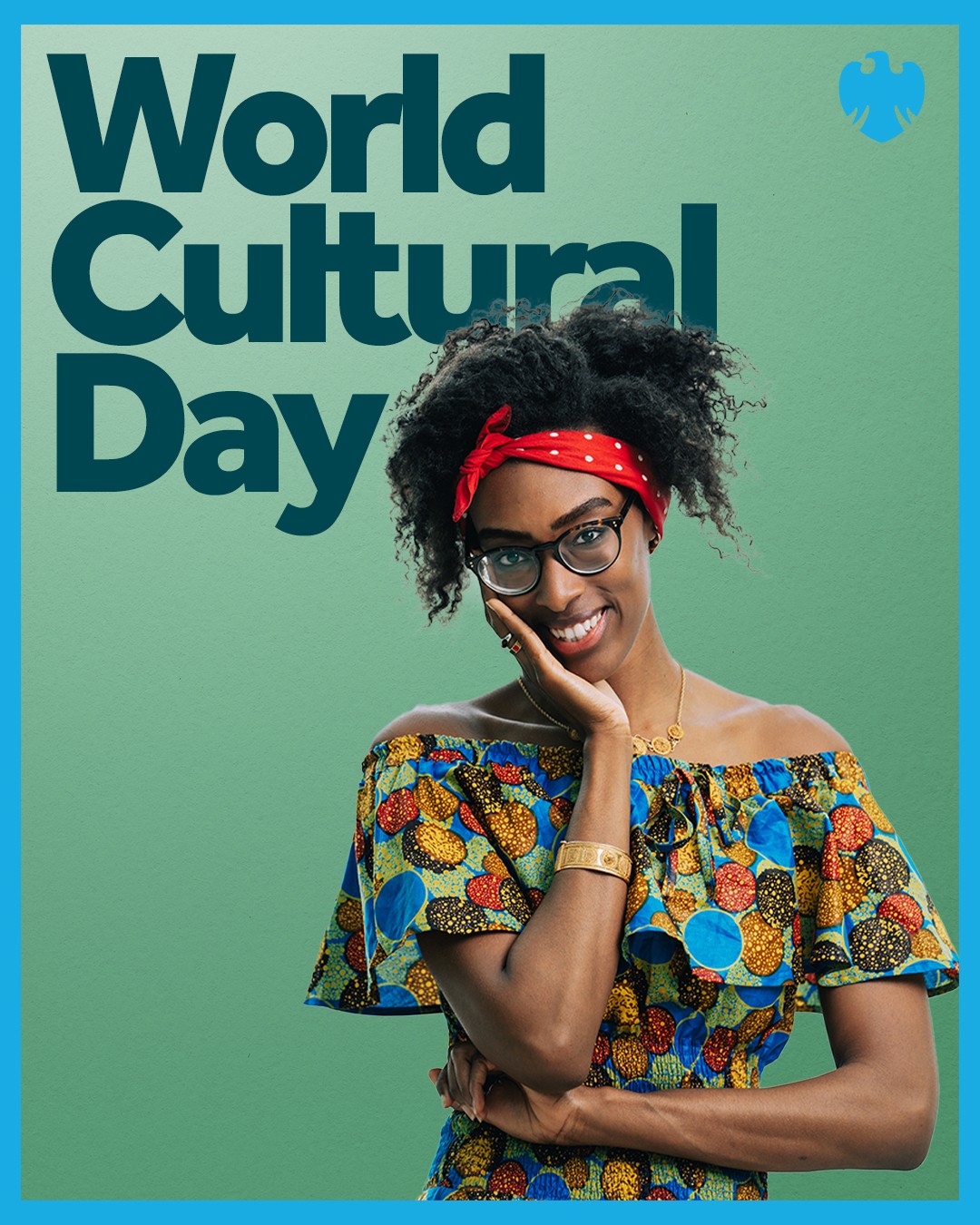
Bringing our whole selves to work: Barclays colleagues mark World Cultural Day
19 May 2023
Not only does a diverse workforce better reflect the many different customers and clients that Barclays serves – but being able to express one’s cultural background, whether in dress or communicative style, also makes for happier and more productive people. Reflecting on the annual United Nations World Day for Cultural Diversity for Dialogue and Development (World Cultural Day), eight colleagues describe how bringing their whole selves to work makes the bank stronger.
Before joining the bank, Nazarene Sutherland, a Diversity, Equity and Inclusion Business Partner of Caribbean, Irish and African heritage, had always felt that “you had to fit the mould in the corporate world”.
As she and other employees prepare to mark UNESCO’s World Cultural Day, one lesson she draws from the event is just how powerful a tool diversity can be. The UN celebration, held every year on 21 May, acknowledges that three-quarters of the world’s major conflicts have a cultural dimension and that forging links between cultures is essential for peace and development.
Similarly, research shows that diverse teams perform better in the workplace, says Nazarene. “A lot of people say that they ‘don't see’ differences – but I think it's really important to see, understand and embrace all of our differences. We should encourage people to be more open about them as well, to support learning.”



Bringing your whole self to work
For Rebecca Lyons, an HR analyst on Barclays’ graduate programme who is of Ashkenazi and Sephardi Jewish heritage, bringing her whole self to work means being open about her Orthodox Jewish religious practices. “I observe the Sabbath,” she says. “Part of this means that from nightfall on Friday night until nightfall on Saturday night I disconnect from my phone.” Barclays has been “hugely accommodating”, she says, in terms of letting her leave early on a Friday, for example.
But this approach, she believes, has benefits that go both ways. It’s “old-fashioned”, she says, to treat work and personal life as “completely separate. You know – go to work from nine to five, then go home and be yourself. It’s an exhausting way to live.”
When it comes to her relationship with her Brazilian cultural background, Aressa Mello, a Vice President in Internal Audit, says she values authenticity – as well as highlighting “dancing, music and good food”.
Previously, she had felt “a little self-conscious” about expressing cultural traits in the workplace. But she witnessed “many, many instances at Barclays of people speaking out, not afraid to be who they are. That motivated me to be the same.”
Rebecca points out that, from a business perspective, it’s hugely important to ensure colleagues can express their individual identities at work. “When you have happy colleagues, you have committed colleagues who enjoy being in the office. When you fail to hit personal notes at work, people start to feel isolated. Their work comes to lack meaning.”
By contrast, a truly inclusive workplace “makes you feel like you're not just a cog in a machine, but somebody who is actively part of a team”. And, she adds, “the bank would be incredibly boring without people with real stories, real lives, and different cultures and identities”.



Belonging and better business decisions
Including a variety of diverse people in decision-making and prioritising diversity of thought, in turn supports business decisions and leads to less “group think”, says Nazarene.
“Without diversity within the bank,” adds Anthony Chitolie, the organisation won’t understand customers’ differences and challenges. The Customer Care Leader says he has benefited from “brilliant leaders” modelling an inclusive attitude since he started working for the bank 20 years ago. Over the past five years or so, he feels the bank has increasingly embraced a proactive approach Diversity, Equity and Inclusion (DEI) as an organisation.
A central part of this is Barclays’ Employee Resource Groups (ERGs) – colleague-led groups which are dedicated to ensuring that all voices are heard, helping to create a culture that attracts, retains, develops and engages talent from diverse backgrounds. In the words of Hannah Awonuga, the bank’s Global Head of Colleague Engagement, Diversity, Equity and Inclusion, they support the organisation to “better understand the needs of our colleagues, clients and community by enabling them to create a sense of inclusion and belonging.”
Wallace Wang, a Diversity, Equity and Inclusion Partner at the bank whose career has taken him from China to Sydney, Hong Kong, Copenhagen and London, has himself joined every one of the resource groups – in some instances as an ally.
Referencing both his Chinese cultural background and the importance of an intersectional approach, Wallace says: “I felt I could be myself from the very beginning. In the interview selection process, I didn’t feel I had to hide my invisible disability or my sexual orientation. I felt strongly that people celebrated your identity, reconfirmed who you are, and appreciated that you shared this information.”
Since joining the bank, ERGs have played an important role for him in connecting with others. “I got to know more colleagues beyond my day-to-day job, and across different backgrounds – which sometimes makes the job easier in a big bank if you have connections to communities that amplify the unique challenges and nuances of diverse groups.”
Jaimal Patel, a Net Zero Pioneer, who recently joined the Asian Professionals Resource Group, says that a promoting an attitude of acceptance throughout the organisation goes a long way – including to understanding your customers better. “I’m from Leicester, one of the most multicultural cities in the UK,” he explains. “I have clients who are very successful, but English isn’t their first language. If I can make things easier for them to understand, we’re probably doing better than the competition.”



"Boldly and authentically being who we are”
Within the bank, exploring the intersection of mental health and cultural backgrounds has been a recent focus – and several Barclays People Leaders are set to participate in an internal panel event on the subject to mark World Cultural Day.
It’s a subject close to the heart of Karl Connor, a Barclays Programme Director of British and Irish heritage, who became a trustee of the mental health charity Listening Ear after his children were supported with pre-bereavement and bereavement counselling when his wife was ill. With people working increasingly from home, which can be isolating, he says that “everybody should be talking about mental health, right up alongside cultural diversity, equity and inclusion, because it's all kind of linked together”.
Jaimal says that his relationship with his Hindu faith and culture helped him when he experienced a period of burnout. He encourages others in the bank to take a kind, open and honest approach – and to ask questions: “The more we talk about different aspects of life, the more inclusive we can be.” Anthony agrees: “What’s really important is to have conversations with colleagues. That helps to change your perceptions or to find others who’ve faced similar challenges.”
For Premier Risk Manager Peace Akuma, who is “proudly Nigerian and proudly Christian”, this culture of dialogue and speaking up is vital. She has come to welcome the attitude that the organisation’s strength depends upon inviting constructive challenges born of cultural differences. “Our differences are the things that make us better rather than draw us apart. We can learn from one another, and boldly and authentically be who we are, with no apologies,” she says.
“There are stereotypes around certain cultures – I think we should do away with them and just get to know people for who they really are, and encourage them to be comfortable and confident. That's the only way that we can actually get the best of everyone – and ultimately be the best in the business.”